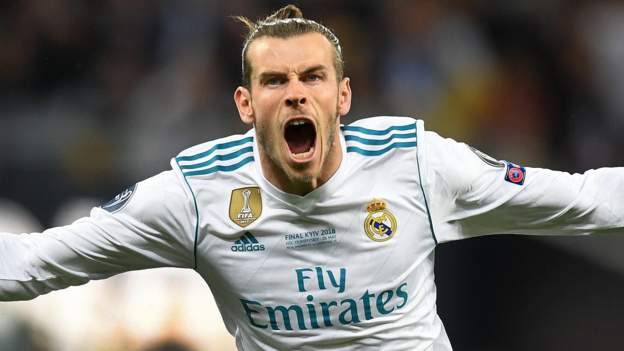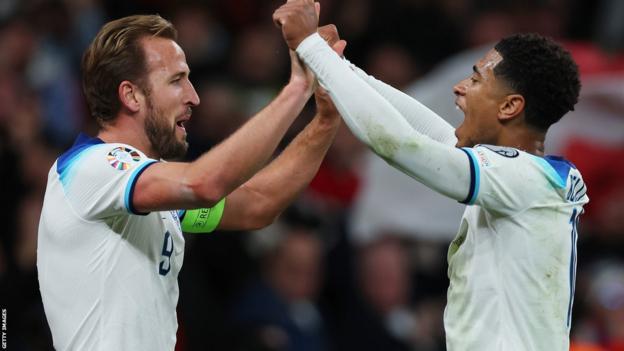
England pair Harry Kane and Jude Bellingham have set the world alight following their summer moves to Bayern Munich and Real Madrid respectively.
They top the goalscoring charts in the Bundesliga and La Liga three months into the season – and could well be on their way to firing their teams to major silverware.
England captain Kane, 30, has netted 21 goals in 15 games – including a record 17 goals in his first 11 Bundesliga games – following his summer move from Tottenham.
Former Birmingham City midfielder Bellingham, 20, is already on his second European club, having joined Real from Borussia Dortmund – and has scored 13 goals in 14 games since that move to Spain.
The pair could be on their way to being considered as some of British football’s greatest exports.
But who else is already up there? Read this list of 10 players and vote for the best at the bottom.
Gareth Bale (Real Madrid, Los Angeles FC)
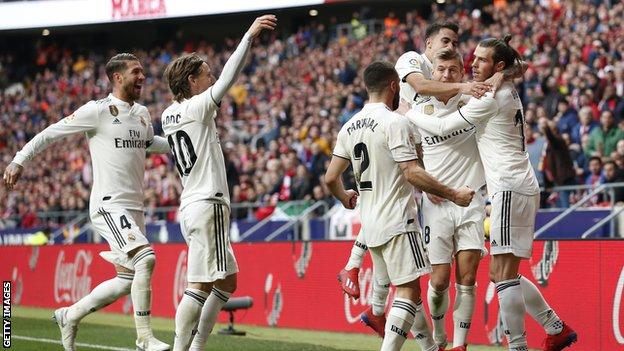
In terms of trophies and goals, Wales’ all-time top scorer Gareth Bale is the most successful British export ever.
He joined Real Madrid from Tottenham in 2013 for a then world-record £85m.
In nine years at the Bernabeu – or only eight if you don’t count the season he spent back on loan at Spurs – he won the Champions League a remarkable five times, scoring three goals in those.
Only one player in history (Real’s Paco Gento) has ever won more European Cups.
Bale also won three La Liga titles, four Club World Cups, three Uefa Super Cups, one Copa del Rey and three Spanish Super Cups.
He scored 106 goals and made 57 assists for Real in 258 games.
But his time in Spain turned toxic, with the media making him a scapegoat and fans turning on him.
Bale ended his career on a high, though, as he left for LA Galaxy FC and scored a last-minute equaliser in extra time in the 2022 MLS final, forcing penalties that saw them beat Philadelphia Union to win the MLS Cup.
That was his final club game as he retired two months later following the World Cup with Wales.
David Beckham (Real Madrid, LA Galaxy, AC Milan, Paris St-Germain)
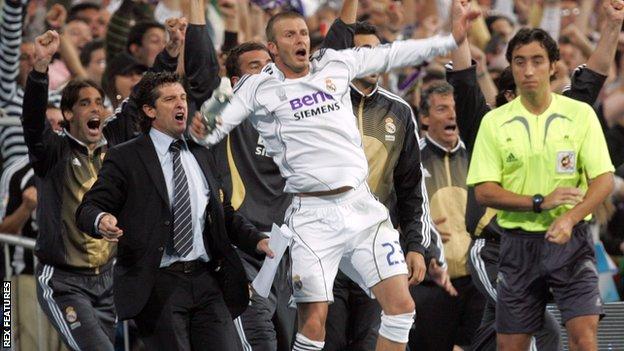
David Beckham’s transfer to Real Madrid from Manchester United in 2003 made headlines around the world.
Beckham’s unveiling was attended by over 500 journalists from 25 countries and, although he did not hit the heights he reached at Old Trafford, Beckham’s trophy haul in four countries earns him a place on this list.
Beckham won La Liga and the Spanish Super Cup in his three years in Madrid before sealing a switch to the United States in 2007, signing a five-year deal with LA Galaxy.
A pioneer for Major League Soccer, Beckham’s signing made global headlines and elevated the league’s profile, a legacy still evident today with the improvement in standard of US soccer’s domestic league.
Beckham was an MLS Cup champion three times in Los Angeles, as well as earning a Ligue 1 title with PSG in 2013. While on loan at Milan, Beckham made his 100th appearance in the Champions League.
Now retired, Beckham continues to be an influential figure in the US, serving as the president of Inter Miami.
John Charles (Juventus, Roma)
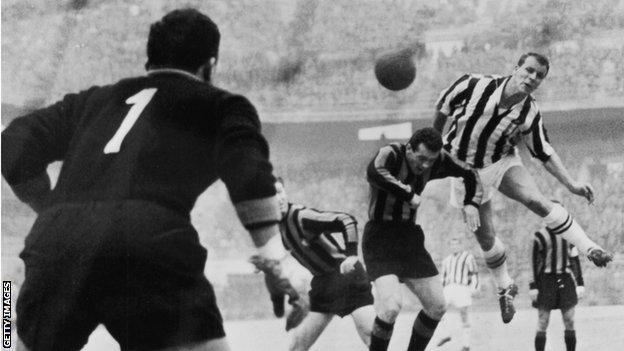
Wales icon John Charles, who died in 2004, was voted the best foreign player to play for Juventus in their centenary year in 1997 – before the likes of Michel Platini and Zinedine Zidane.
He was the first British player to move abroad and arrived in Turin in 1957 for a then British record transfer fee of £65,000 from Leeds United.
Charles was another to hit the ground running, scoring the winning goal in a 3-2 victory against Hellas Verona on his debut. He ended his first season with 28 goals as Juventus won the league and was named Italian player of the year.
Swansea-born Charles could play both up front and in defence and was affectionately known as ‘Il Buon Gigante’, the gentle giant, as incredibly he was never booked during his career.
He went on to win two more Scudetti and the Coppa Italia twice during his stay at Juve. Charles also had a brief spell at Roma later in his career.
Laurie Cunningham (Real Madrid, Sporting Gijon, Marseille, Rayo Vallecano, Charleroi)
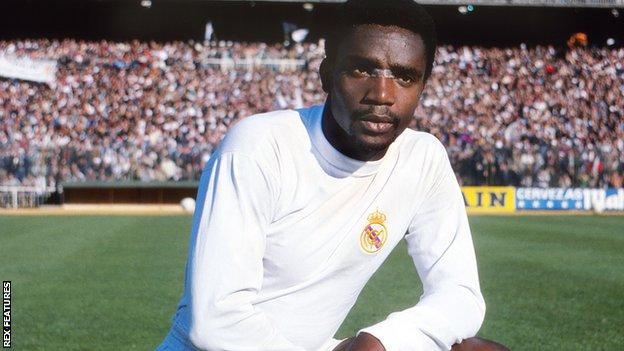
Laurie Cunningham, one of the first black players to represent England, was a trailblazer and a fine footballer. Former Spain manager Vicente del Bosque, his team-mate at Real Madrid, described him as “the Cristiano Ronaldo of his era”.
He joined Real from West Brom at the age of 23 for a club-record £950,000 in 1979 – and it looked like a huge career was ahead of him.
In his first season in Spain he helped Real win their 20th league title and the Copa del Rey. But that was the peak of his career.
A bad injury, and then photographs of him dancing in a nightclub with a plaster cast, saw the media turn on him.
He never hit the heights again and spent most of the remainder of his career abroad – in Spain, France and Belgium – before he died in a car crash at the age of 33.
Paul Gascoigne (Lazio)
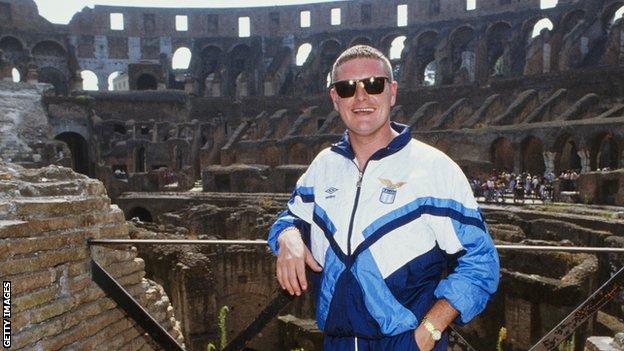
England playmaker Paul Gascoigne’s three years with Lazio in Serie A were plagued by injury – but there were some magic moments too for which he will not be forgotten.
His £5.5m move from Tottenham to Lazio was delayed by a year until 1992 while he recovered from a bad knee injury, sustained while fouling Gary Charles in the 1991 FA Cup final against Nottingham Forest.
In Italy, he broke a cheekbone and also broke a leg in training while attempting to tackle Alessandro Nesta.
Gascoigne scored six times for Lazio, including a late equaliser in the Rome derby against Roma in November 1992, and was a cult hero for the Serie A side.
He also helped increase the popularity of Italian football in the UK. His move coincided with the start of the iconic Football Italia show on Channel 4.
Gascoigne had one more brief spell abroad, with Chinese club Gansu Tianma, late in his career – but let’s be honest, that’s not why anybody thinks of him as a good export.
Kevin Keegan (Hamburg)
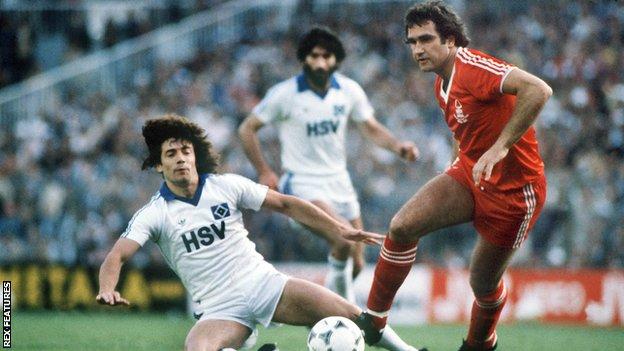
Kevin Keegan became the highest-paid player in German football when he left Liverpool to move to Hamburg in 1977.
The England striker did not make an auspicious start as he found it hard to settle and was sent off during a friendly against VfB Lubeck for punching an opponent, earning an eight-week ban.
But Keegan ended the season with 12 goals and the 1978 European Footballer of the Year award, now known as the Ballon d’Or.
The following season he led Hamburg to their first league title in 19 years, scoring 11 goals in the last 12 games of the season, and was again named European Footballer of the Year. Fans affectionately christened the 5ft 8in forward ‘Machtig Maus’ – Mighty Mouse.
Keegan’s final year at Hamburg was a story of near-misses, as the German side destroyed Real Madrid 4-1 in the second leg of their European Cup semi-final to go through 5-3 on aggregate. But the final against Nottingham Forest proved a step too far, with Brian Clough’s side winning 1-0.
Hamburg were also pipped to the Bundesliga title by a resurgent Bayern Munich and Keegan returned to England with Southampton, having made 125 appearances and scored 43 goals.
Paul Lambert (Borussia Dortmund)
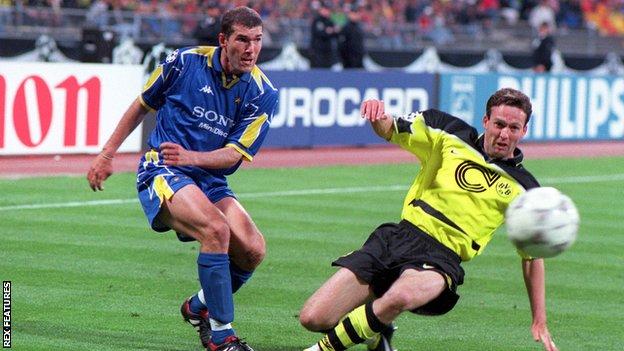
Before he became a Norwich manager that every football fan in Norfolk has a strong opinion of, Paul Lambert proved a huge success as a player for Borussia Dortmund.
A surprise capture from Motherwell in 1996, Lambert was signed by Borussia Dortmund following strong performances against the club previously in the Uefa Cup.
Lambert instantly proved a key figure for Dortmund under Ottmar Hitzfeld, deployed as a holding midfielder and performing in the role with great distinction.
Dortmund reached the Champions League final in Lambert’s first season and the Scotland midfielder produced a man-of-the-match display in the biggest game of his club career.
The German side stunned Juventus to win the tournament thanks to a 3-1 success in the final, with Lambert becoming the first British player to win the European Cup with a non-British side.
Lambert set up Karl-Heinz Riedle for the opening goal, but even more impressive was the man marking job he did on Zidane.
Gary Lineker (Barcelona, Nagoya Grampus Eight)
England striker Gary Lineker joined Barcelona straight after winning the 1986 World Cup Golden Boot and spent three years with the Catalan side.
He would go on to win two trophies, the Copa del Rey in 1987-88 and European Cup Winners’ Cup in 1988-89.
But his main claim to fame was his El Clasico hat-trick in a 3-2 win over Real Madrid in his first season.
He netted 52 goals in 138 games for Barcelona before returning home to Tottenham.
Lineker would end his career with two injury-hit seasons with Japanese side Nagoya Grampus Eight.
Steve McManaman (Real Madrid)
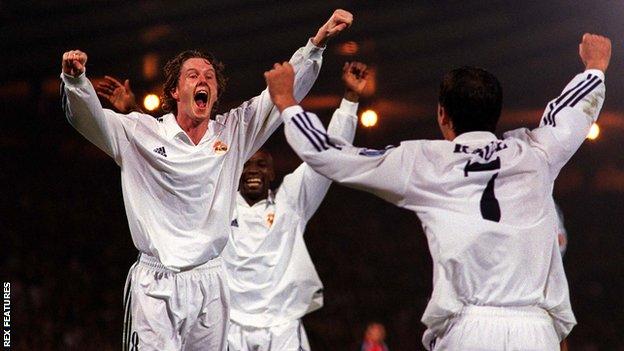
Steve McManaman left Liverpool to join Real Madrid on a free transfer in 1999 and established himself in a team packed full of superstars.
The England winger played 158 competitive games in four seasons and scored 14 goals, helping Real win two Champions Leagues, two La Liga titles, one Uefa Supercup, one Intercontinental Cup and one Spanish Supercup.
McManaman enjoyed a spectacular first season at the Bernabeu, with their march to the Champions League title as thrilling as their domestic struggles were puzzling.
Having seen off Bayern Munich in the semi-finals, Los Blancos faced Spanish rivals Valencia in the final at Stade de France.
With Real 1-0 up through a first-half goal from Fernando Morientes and the game still delicately poised, McManaman scored a sensational volley that helped Real win 3-0 and seal his man-of-the-match award.
The next season Real won La Liga for the first time in four years and McManaman would add a second La Liga and the 2002 Champions League title before moving back to England with Manchester City in 2003.
Chris Waddle (Marseille)
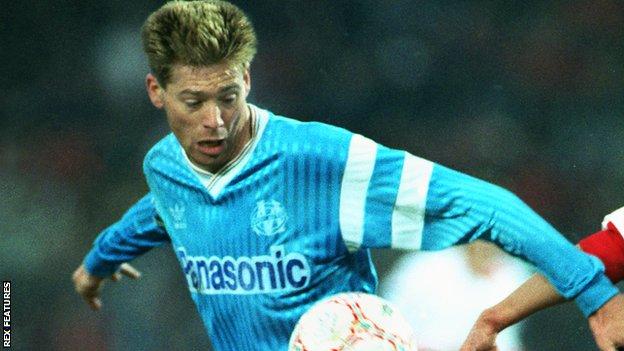
With Tottenham Hotspur in financial difficulty in 1989 and having just signed Lineker from Barcelona, Marseille were able to prise Chris Waddle away from White Hart Lane for an eye-catching £4.5m, the third-highest transfer fee ever paid at that time.
It was in Marseille Waddle produced arguably the greatest form of his career, particularly in the campaign after England’s World Cup semi-final defeat on penalties by West Germany at Italia 90, with Waddle missing his spot-kick.
Waddle soon became the toast of Provence with his easy, loping style earning him the nickname ‘Magie Chris’ – Magic Chris – as he went on to score 28 goals in 140 appearances for OM.
Waddle steered Marseille to three successive league titles in 1990, 1991 and 1992 with Marseille also reaching the 1991 European Cup final, where they were defeated on penalties by Red Star Belgrade.
Indeed, such was Waddle’s success at Stade Velodrome that in 1998 Marseille’s fans voted Waddle their second greatest player of the century, behind striker Jean-Pierre Papin.
If you are viewing this page on the BBC News app, or if it isn’t displaying correctly in the BBC Sport app, please click here to vote.
Source link
credite

